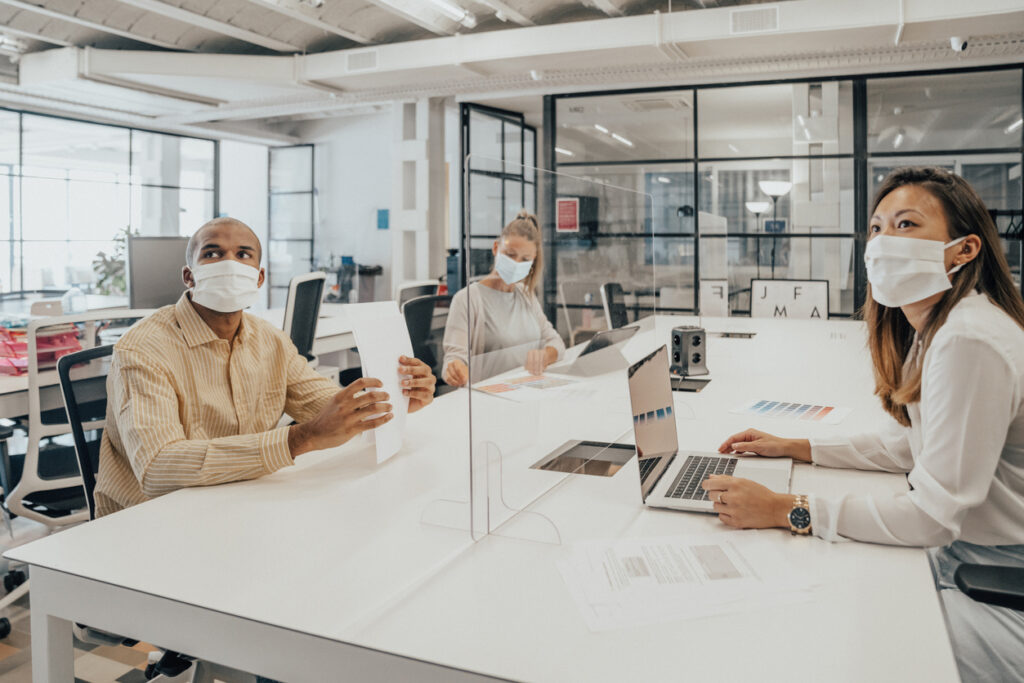Over the weekend lockdown restrictions (in England, at least), eased considerably. With more non-essential businesses allowed to reopen, including restaurants, bars and hotels, life will regain some little crumbs of normality. It seems the countdown to when offices have to negotiate the tricky problem of reopening safely might not be too far away either. This will mean a lot of people suddenly thrust back into the world of (non-home) work and it could be a shock to the system.
When workers return to the office, they’ll be carrying the burden of pandemic trauma and employers will have to be prepared for the anxiety this will create.
A recent study from Bupa Health shows that 65% of UK workers are scared about getting back to work, so with this in mind, how can employers make the transition as easy and comfortable as possible?
Let’s talk about anxiety
Being able to hold a cool pint in a pub garden on the 4 of July may have brought with it a warming sense of familiarity, but the reality is that nothing is quite the same now – we’ve all collectively lived through a crisis.
Everyone’s lockdown experience has been personal. We’ve all faced unique challenges during this time. There are those who have lost work or been furloughed, dealing with fear and uncertainty about the future. For many, it’s been a juggling game, with some working whilst parenting, or suffering a serious illness or loss at the same time as trying to hold down their job. What is universal in everyone’s experience is a moment of realisation that this is all quite mad – we’re living and working through a global pandemic and that’s no mean feat.
With health top of the agenda for many people now, getting creative with benefits and rewards focused around wellbeing might boost staff morale and increase their confidence in the workplace.
Although there are those that have found the period of lockdown beneficial to their mental health, with some feeling more gratitude for the simple things and enjoying the space or the flexibility of remote working, the general consensus is that it’s been tricky. A recent report indicated 80% of Brits working from home have found it has had a negative impact on their mental health, with many feeling lonely and isolated. What’s more, on an existential level, living with the constant fear of a potentially deadly disease is also all-consuming and exhausting, with the lockdown and the pandemic triggering serious mental health issues in people who haven’t suffered with them before.
When workers return to the office, they’ll be carrying the burden of pandemic trauma and employers will have to be prepared for the anxiety this will create. They’ll also have to be ready to handle a full spectrum of attitudes from ‘young invincibles’ to those, older or with underlying conditions, who will see the new office as a medical minefield. Leaving dirty mugs in the sink or loud coughing will no longer be simple irritations, for some they’ll trigger major anxiety due to the very real risks involved. Employers will have to have very clear workplace rules and ensure that they are followed by all.
Risk assessment
So, what active steps do employers need to take? First off, managers will need to establish whether it’s essential for employees to return. It might be a case of giving staff the option to return to the office on a certain date, but allowing home working still for those who are concerned. This will also be important for ensuring there is space in the office and people aren’t crammed in next to each other. To add another layer of safety, allowing people the option to return in shifts should mean the office always has ample space for social distancing.
The office of the pre-pandemic days was designed for people to collaborate and share ideas, but this will need a rethink. Cubicles will probably be the order of the day, with open-plan spaces likely needing partitions. What’s more, cleanliness really will be next to godliness in the new office. There was a time when beer taps in start-up offices in the city were all the rage, but this may now be replaced with hand sanitiser on tap as we all become a lot more concerned about hygiene than ‘hydration’.
Rethinking perks
Not only will the physical environment of the office change, the things that staff value will likely shift too. Employers will have to give their employee benefits a revamp as working life transforms. While most people previously took the tube to work, and considered being packed into a tight space with someone’s suitcase digging into their back as just one of the many rituals of the working day, people are more likely to avoid these confined spaces now. Season ticket loans might be less sought after, so employers might want to pivot towards other benefits options such as bike loans, and providing biking facilities and parking.
It goes without saying that remote working will continue to be a must for the foreseeable future, if not embedded into our work culture forevermore. Additionally, having the option of flexitime will alleviate some stresses for staff. Giving staff the opportunity to work outside the traditional nine-to-five patterns will reduce crowding on public transport at peak times, thereby making the commute safer for those who are doing it, and reducing concern for staff.
With health top of the agenda for many people now, getting creative with benefits and rewards focused around wellbeing might boost staff morale and increase their confidence in the workplace. This could range from virtual yoga, socially distanced exercise classes or boxes of healthy treats in the post.
The post-pandemic workplace will need a rethink as we all adjust to new ways of working, but there are measures employers can take to ensure it as safe and comfortable as possible.
Interested in this topic? Read How to create a post-pandemic social contract.











